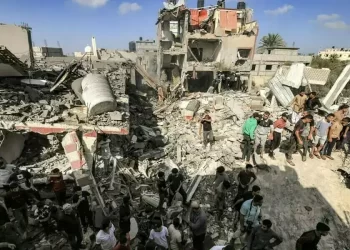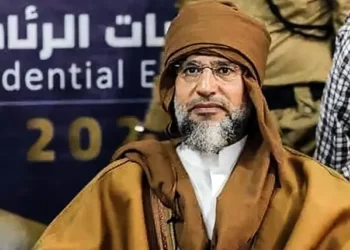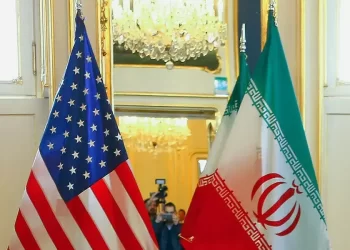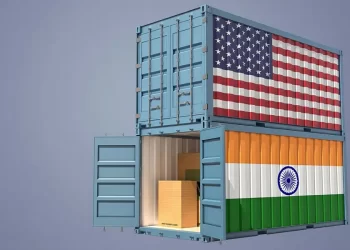KYIV, Ukraine (news agencies) — As an investigative journalist, then an activist, and later a lawmaker, Yehor Soboliev sought to expose corruption in business and government as a way to defend Ukraine’s budding democracy.
Now, as a soldier battling Russia, he’s had to put those aims on hold as he fights alongside some of the people he once tried to bring down.
“Till the victory, we are on the same side,” said Soboliev, a lieutenant in a front-line drone unit. “But maybe — definitely — after the victory, we should separate ourselves from each other. And we should continue that fight in making our country more honest, more responsible, more serving to its citizens.”
Ukraine has spent years trying to build a Western-style democracy, although not without some bumps along the way as it shed habits from its Soviet past. Russia’s full-scale invasion two years ago raised the stakes of these democracy-building efforts, which are fundamental to Ukraine’s goal of joining the European Union and NATO.
Soboliev’s feelings capture a paradox within Ukraine: To beat back Russia and remain a democracy it has felt compelled to temporarily suspend or restrict some democratic ideals.
Elections have been postponed, a once-robust media has been restrained, corruption-fighting has slipped down the agenda, and freedom of movement and assembly have been curbed by martial law.
And as Russia pounds Ukraine’s cities and makes battlefield gains, the unity sparked by the invasion — and the sense of common purpose crucial to defending democracy — have come under growing strain.
This story, supported by the Pulitzer Center for Crisis Reporting, is part of an ongoing media series covering threats to democracy in Europe.
___
When comedian-turned-politician Volodymyr Zelenskyy was elected Ukraine’s president in 2019, he promised to crack down on corruption that had flourished for decades after the collapse of the Soviet Union.
War hasn’t made that any easier. Corruption exists at a “frightening scale” in Ukraine, the pro-democracy organization Freedom House said in a February report, noting that it “metastasized within the army in 2023,” especially around defense contracts and men seeking exemptions from the draft.
The European Union says Ukraine must reduce corruption before it can join the 27-nation bloc and in November said the country had made “some progress” but needed to do more, especially on “high-level cases.” Ukraine’s defense minister, agriculture minister, top prosecutor, intelligence chief, and other senior officials have been pushed out over the past two years, and last year the head of the Supreme Court was arrested for allegedly taking bribes.
But Ukraine’s judiciary has been an obstacle. After Zelenskyy took office, Ukraine’s top court said officials no longer needed to declare their assets in an electronic register. That decision was overturned, in part due to public pressure — but it was just one of many that have undercut anti-corruption efforts.
Still, Olha Aivazovska, who chairs the pro-democracy charity OPORA, believes pressure to eliminate corruption will be maintained by Ukraine’s desire for EU membership.
“Ukrainian politicians will not win any elections after the end of the war if they will not be successful on the EU integration track,” she said.
Zelenskyy indefinitely postponed the 2024 presidential election because of the war. With almost one-fifth of Ukraine occupied by Russia and millions of citizens displaced from their homes, Ukraine’s opposition leaders supported the decision, and opinion polls suggest most Ukrainians agree.
But some Ukrainians grumble about the power Zelenskyy has accumulated. Criticism of him grew last year after Ukraine’s failed counter-offensive, and political rivals are testing the ground.
Kyiv Mayor Vitalii Klitschko has accused Zelenskyy of becoming increasingly autocratic, citing the replacement of some elected mayors with military officials. Zelenskyy’s immediate predecessor as president, the candy magnate Petro Poroshenko, says he is planning a postwar comeback. And in a possible sign of his desire to sideline rivals, Zelenskyy in February dismissed the country’s popular military chief, Gen. Valerii Zaluzhnyi.
Russian President Vladimir Putin has used the canceled elections to question Zelenskyy’s legitimacy. The idea of Zelenskyy as anti-democratic has been echoed in the U.S. by some Republicans in Congress who oppose military support for Ukraine.
Aivazovska rejects that argument. “During wartime, Ukraine can be a democracy even without elections,” she said — as long as it strengthens its media, local government and civil society organizations.









